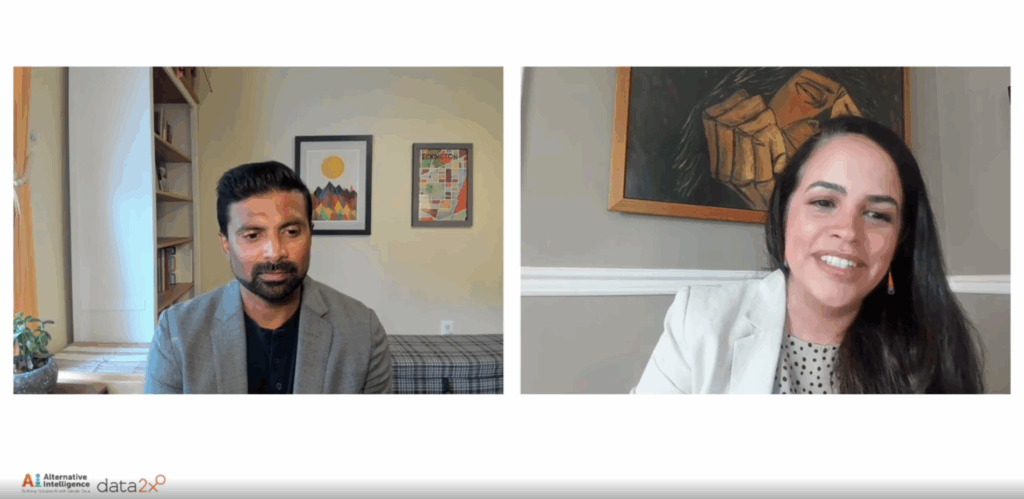In this blog, Data2X unpacks key insights from Episode 2 of AI: Alternative Intelligence podcast, featuring Ginette Azcona. Listen or watch the full conversation on Spotify or YouTube.

When most people talk about artificial intelligence, the focus is usually on speed, profit, or competition—who’s building the biggest model, which company is worth the most, or which country is “winning the AI race.” But as Ginette Azcona — longtime UN Women researcher, data scientist, and now Research Fellow at The New School and Founder and Executive Lead of KAIA Network — reminds us, the real question is simpler and more urgent: is AI making life better for people?
On the latest AI: Alternative Intelligence podcast episode, Ginette shared lessons from her career in gender data and her vision for a more inclusive AI future. Her work bridges the worlds of policy, data, and technology—and three themes stood out: the power of gender data, the need to redefine “value” in AI beyond profit, and the importance of democratizing who gets to shape innovation.
Why Gender Data Matters
Without numbers that show how different groups are doing—across gender, race, disability, and more—whole communities become invisible in policymaking and in the AI systems trained on those datasets. At UN Women, Ginette led efforts to track progress for women and girls across all 17 Sustainable Development Goals. Soon, she’s launching a new People’s AI and Data Lab at The New School to bring together two groups: social scientists who understand inequality and technologists who build AI. The Lab is considered the academic arm of the KAYA Network, a recently launched project, the KAIA Network, bringing together researchers from across the world to have a seat at the table in shaping AI’s future.
The idea is to combine their strengths to design smarter, fairer systems that reflect the full picture of human experience. As Ginette puts it, “the goal is to democratize access to these tools and ensure emerging technologies truly serve the people they’re meant to benefit.”
For more on the topic of gender data’s role in responsible and equitable AI, see Data2X’s recent report on ‘The Gender Data Foundations of Responsible and Equitable AI.’
AI as a Tool for Human Flourishing
Right now, most conversations about AI are dominated by profit and markets, measuring success in terms of dollars and GDP growth. But Ginette challenges that framing. AI, she argues, should be judged by whether it helps people live healthier, fairer, and more sustainable lives. “Growth is part of the equation,” she notes, “but it can’t come at the expense of people or the planet.”
That means redefining what “value” means in the AI economy—not just efficiency or output, but equity, sustainability, and human well-being. For Ginette, AI’s true potential lies in enhancing creativity, collaboration, and connection, not replacing them. It should help people thrive, not compete.
“We need to make sure AI serves humanity, not just markets.”
Its true value must be measured in human terms—equity, dignity, and opportunity, not just profit or speed.
The Power of Diverse Voices
One of Ginette’s strongest call to action was that diversity isn’t just about fairness—it’s about better ideas. When women, Global South researchers, or indigenous communities are left out, everyone loses. Different perspectives spark innovation and lead to more creative, more useful solutions. Yet, she noted; we’re living in a moment where diversity and inclusion are sometimes dismissed or even attacked. The challenge is to prove that inclusion isn’t just the right thing to do—it’s essential for building AI that serves people. Her new project, the KAIA Network, is designed to counter those trends by breaking down barriers to geography and access.
“Geography shouldn’t decide who gets to participate in the AI revolution.”
We have to open up spaces, connect researchers globally, and make sure diverse voices lead—not just follow—AI innovation.
Looking Ahead
Ginette’s message is a hopeful one: AI doesn’t have to be about who “wins.” It must be about building tools that lift everyone up. But that requires investing in better gender and inclusive data systems, redefining what success and progress look like, and making space for voices that have too often been ignored.
In short, AI should help us become more human—not less.
